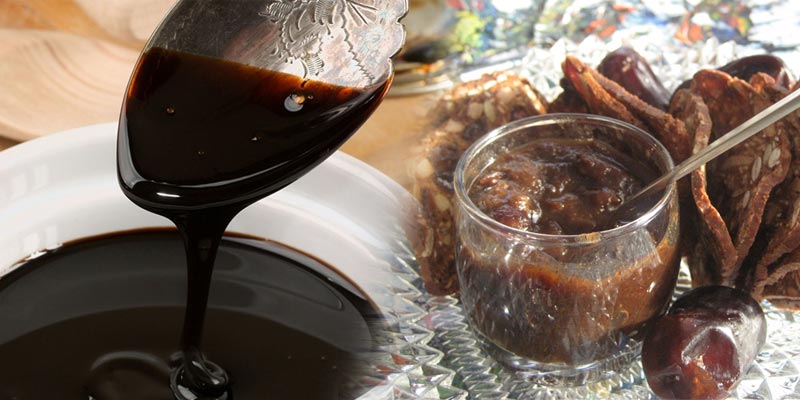Presentation of the
Dérivés de Dattes
The date sector is very important in Tunisia. Tunisia is the world's biggest dates exporter in terms of value; and dates are the second most important export product of the Tunisian agri-food sector after olive oil.
In the oasis regions, the income of the majority of the population is linked to the dates sector. Over 200 varieties of dates are cultivated in Tunisia, but the most widespread variety is the Deglet Ennour. The production of Deglet Ennour represents 30% of world production and 70% of total national production of dates. Over the past ten years, production in Tunisia has more than doubled; exports of certified organic dates are also increasing and account for almost 10% of export earnings.


The date sector is very important in Tunisia. Tunisia is the world's biggest dates exporter in terms of value; and dates are the second most important export product of the Tunisian agri-food sector after olive oil.
In the oasis regions, the income of the majority of the population is linked to the dates sector. Over 200 varieties of dates are cultivated in Tunisia, but the most widespread variety is the Deglet Ennour. The production of Deglet Ennour represents 30% of world production and 70% of total national production of dates. Over the past ten years, production in Tunisia has more than doubled; exports of certified organic dates are also increasing and account for almost 10% of export earnings.
In Tunisia, most efforts are focused on developing the fresh dates sector. A national strategy and several subsidies exist to promote the production of fresh dates. However, the valorization of processed dates is considered as a secondary activity. But this is expected to change. Processed dates are mainly produced by using grade-outs that represent 30% of fresh dates production. Due to global warming, the quality of Tunisian dates is changing, which implies an increase of the raw material available for processing. Grade-outs are bought at very low prices, but after processing their value can increase by five.
The processed dates value chain may indeed become more profitable than that of fresh dates. Furthermore, the storage period of processed dates is longer, which offers greater flexibility for marketing.
The private sector is increasingly aware of the opportunities that are arising. In Tunisia there are now around 40 companies and more than 20 start-ups that produce processed dates. International demand for processed dates is increasing. Between 2014 and 2018 the export value of date paste almost tripled and that of dates for industrial use more than doubled.
Today the main product of the sector is date paste, but several Tunisian companies have already started diversifying and innovating and produce different agrifood, dietetic and even cosmetic products such as syrups, sugars, vinegars, coffee substitutes, energy bars, chocolates, flour, powder, date stone oil etc.
The potential of the processed dates sector remains far from being fully grasped. The PAMPAT 2 project works closely with the Ministry of Industry, the Interprofessional Date Group (GID) and the Export Promotion Center (CEPEX) to support the development of the processed dates industry in Tunisia.
Le secteur privé est de plus en plus conscient des opportunités qui se présentent. En Tunisie il y aujourd’hui une quarantaine d’entreprises et plus d’une vingtaine de start-up qui produisent les dérivés de dattes. La demande internationale pour les dérivés de dattes est en train d’augmenter. Entre 2014 et 2018 la valeur des exportations de pate de dattes a presque triplé, tandis que la valeur des exportations des dattes à usage industriel a plus que doublé sur la même période. Le fait que le gros des processus de transformation se réalise à l’étranger représente un manque à gagner important.
Même si le principal produit de la filière est la pâte de dattes, quelques sociétés tunisiennes sont déjà orientées vers l’innovation et produisent différents produits agroalimentaires, diététiques et même cosmétiques tel que les sirops, sucres, vinaigres, succédanés de café, barres énergétiques, chocolats, farines, poudre de noyaux, huile de noyaux de dattes etc.
The potential of the processed dates sector remains far from being fully grasped. PAMPAT 2 project works closely with the Ministry of Industry, the Interprofessional Date Group (GID) and the Export Promotion Center (CEPEX) to support the development of the processed dates industry in Tunisia.
More documents and videos relatifs à la filière sont disponibles ici.
![]() Facebook page to promote the Tunisian processed dates
Facebook page to promote the Tunisian processed dates
Project for Market Access of Typical Agrofood Products (PAMPAT Tunisia) funded by the State Secretariat for Economic Affairs of the Swiss Confederation (SECO) and implemented by the United Nations Industrial Development Organization (UNIDO) in close cooperation with the Ministry of Economy, Finances and Investment Support, the Ministry of Industry, Energy and Mining and the Ministry of Agriculture, Hydraulic Ressources and Fisheries.


